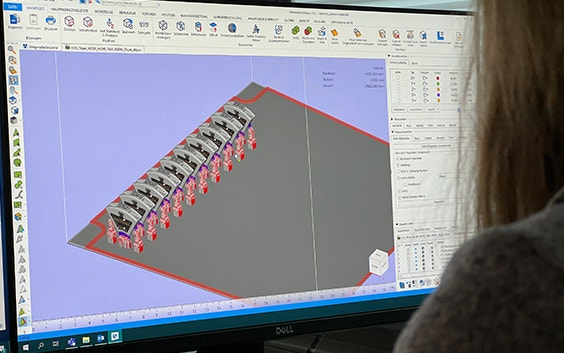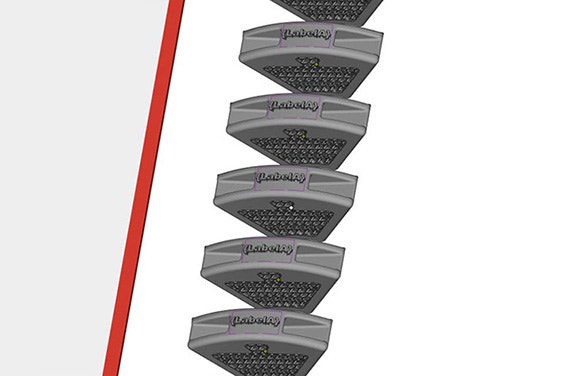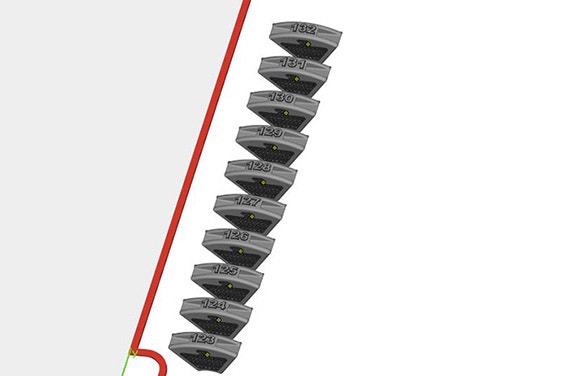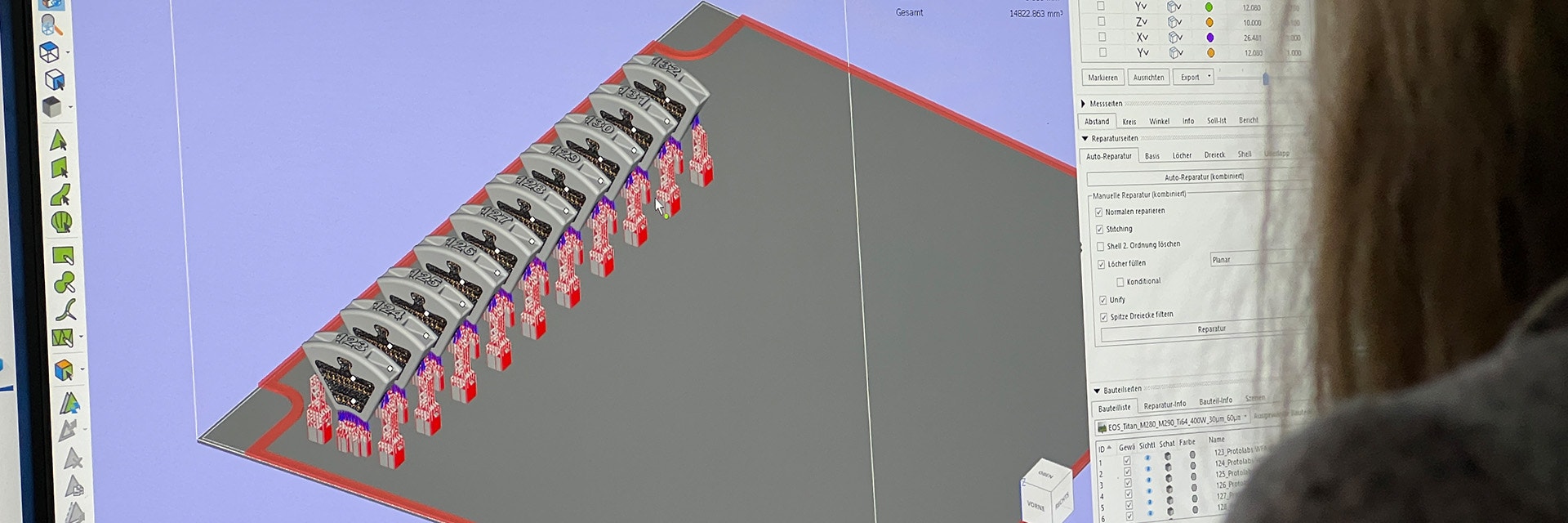CUSTOMER STORY
Identify, Collaborate, Automate: Eliminating Repetitive Tasks with Protolabs

When it comes to digital manufacturing — 3D printing in particular — there are many opportunities to automate processes and speed up production. We partnered up with Protolabs, an additive manufacturing (AM) service provider, to identify repetitive tasks in their workflow, create an automated solution, and ultimately reduce time spent labeling implants by nearly two hours per build.
Exploring Protolabs' process
Automation is a trending topic right now, with AI and ChatGPT making waves in many industries. At Materialise, our software team has been automating tasks, such as nesting and support generation, for years. Now, their sights are set on creating custom scripts for users' repetitive tasks with the new Magics Software Development Kit (SDK), available for our Magics and CO-AM Software Platform users.
Materialise and Protolabs have worked together for more than ten years, and Protolabs is very familiar with using software tools such as Magics and e-Stage for metal to streamline their workflow. In 2022, the teams discovered that Magics SDK was a promising solution to help Protolabs save time on repetitive tasks in their work. After explaining more about the software, Materialise set up a discovery session with Protolabs to explore their processes and identify the best workflow to automate first.
The teams reviewed the process from order to shipment and determined several steps that would benefit from automation. However, one task stuck out in their metal 3D printing production as the best option to test: automating the labeling of spinal implants. It's a simple task that doesn't utilize the team's unique skills and even hurts motivation, so it's the perfect candidate for Magics SDK. These medical parts are more cost-effective to print than to mill, but there are still potential time savings in their digital workflow that could bring productivity to another level.
Labeling: from boring and tedious to quick and motivating
The effort required for this labeling task involved adding a unique identifier of 10 to 12 digits to each implant in a build, which would take a couple of minutes per part. When a build calls for dozens of parts, that time labeling really adds up.
"When we get an order from a customer, we are talking about 40, 50, 60 different geometries, which each need these labels placed on them," explains Christoph Erhardt, Manager Customer Projects & Additive Design at Protolabs. "So, for each part, we had to delete the old label, close the shell, create a new number, save it as an STL, and then start prepping. It was boring but necessary work, costing valuable time from our preppers."
And when it comes to producing medical parts, labeling isn't a step that you can skip or cut corners on. Each part needs to be traced from start to finish to stay compliant with regulations, and Protolabs even had a second data prepper reviewing the labeling work to reduce the risk of errors. This is time that could be used in a much smarter way for the benefit of production and even team members' job satisfaction.
“Now the team can use their time for more challenging, interesting work that truly motivates them.”
— Christoph Erhardt, Manager Customer Projects & Additive Design, Protolabs
Developing and validating
Collaboration on the automation tool began with a first draft, shared by Materialise two weeks after the teams identified their goals with this project. The first draft already worked and showed great promise, so next, Protolabs gave Materialise feedback on specific requests for the tool to perfectly fit their workflow. And after three to four iterations and two test rounds, the final software tool was ready to be implemented.
With the script in hand, Protolabs now had to re-engineer their process to fully take advantage of the advantages automation offers. Protolabs adjusted their previous way of working by identifying 'families' of parts. This one-time effort involved grouping together sets of 12 to 20 parts for Magics SDK to recognize and rapidly label according to Protolabs' standards. Once this process was complete, the tool was ready to eliminate dull labeling efforts.


With the smart labeling script, you only need to indicate the label location once, and the tool automatically applies labels to any duplications of your prepped part.
"Labeling 20 parts takes just one person maybe five minutes with our new automated workflow. Before, it was an hour and a half, two hours for two people. It wasn't fun work. They no longer have to wait until 6 pm to start a machine on a Friday, for example. And now the team experiences less stress and uses their time for more challenging, interesting work that truly motivates them," says Christoph.
Freeing up roughly two hours per build gives the preppers more time to spend on tasks where their expertise is truly needed, such as optimizing machine management, orienting parts, and more. And, of course, starting a machine two hours early because of smart labeling gives the team much more flexibility. "It makes us more agile," shares Christoph. "We can react quicker. If we get a request for parts in the morning, we could even have the order on the machines the very same day."
Automation: the future of AM
After finding success with the first Magics SDK process, Protolabs foresees it also making a difference in other aspects of their metal 3D printing production. The team already automates about 90% of their stereolithography support generation, but they see more opportunity for this task in metal. After automating the initial support generation, they still need to strengthen support in certain areas to properly support the parts. In the future, Protolabs would like to have nearly all support generation automated for their metal parts.
Automation is a handy tool for tasks involving parts with similar geometries, but another focus for the future is applying it to one-off parts. This will be an especially valuable asset for companies where prototyping makes up most of their work.
"Automation for hardware and software helps us increase quantities," says Christoph. "At the moment, we could technically achieve any quantity that the customer is asking for, but based on the geometry, a purchasing colleague might flag it as becoming too expensive after a certain number of parts. We can lower this price by automating more during preparation and post-processing. Automating the flow of the machines is crucial too — getting more efficient, more productive machines."
“At Materialise, we’re continuing to bring the power of automation to additive manufacturers,” says Koen Neutjens, Product Manager of Magics SDK. “This smart labeling application is now available for Magics and CO-AM users. Coming up, we plan to offer many more automated functions through close collaboration with our customers.”
Share on:
You might also like
Never miss a story like this. Get curated content delivered straight to your inbox.
